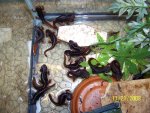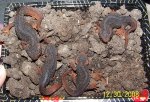- Joined
- Dec 13, 2006
- Messages
- 6,624
- Reaction score
- 120
- Points
- 63
- Location
- Wappingers Falls, NY
- Country
- United States
HI Revan,
Your larva looks so different from mine! Mine are so dark, yours is lighter. Mine were lighter when younger.
I think there are numerous factors in trying to predict metamorphosis. One that I've noticed with this batch is water quality. I have two tanks, one large with many larvae, one small with just a few (the few I am keeping). The larger one I was reluctant to clean/ siphon much because I didn't want to suck up larvae and hurt them. Now that they're bigger this has changed, though. But I think it contributed to the earlier metamorphosis of some of the larvae in the larger tank. They have smaller gills too, and their tank has less oxygen going than the other tank: one airstone for the larger tank vs. one airstone for the smaller tank. I think temperature is definitely a factor too, though in this case it's not a variable between tanks.
Now, I don't think that the larger tank is unhealthy for its different parameters; it's not like the tank was filthy or there's not enough air. The gills are only slightly smaller. The individuals look large and healthy and are active and feed very well. I don't think these are any different than parameters the animals would encounter from pond to pond where they might develop in the wild, and these animals are well adapted to deal with the variety of conditions they might end up in, in the wild. In fact, the second smaller tank is cleaner than any tank I've raised any species in so far; my method has been (for the very few years I've been doing this) a tank so "dirty" that I can't even really tell how many larvae I have until they all morph. The second, smaller tank is so clean because it was the tank I kept the adults in, these are larvae from eggs I didn't find to transfer to the egg tank/hatchery and ended up growing up with the parents, Eddie and Elektra, who I only recently moved into a different tank back up to the living room from the basement where most of my newt stuff is. I just missed them too much and it cooled off enough to bring them back up. So now these "overlooked" larvae are alone in a tank in the basment (That's the tank that Hector is in, I'm keeping the ones from the smaller tank).
Another factor that would change the morphing schedule is food, quality and quantity. I'm sure there are more but that's all I can think of right now. Just ballpark guessing, the larva in your picture looks similar to the larvae I pictured at about a month after hatching. That's 30 days vs. your 82. But keep in mind that's just a guess from the pictures.
And that, my friends, is making a short story long.
Your larva looks so different from mine! Mine are so dark, yours is lighter. Mine were lighter when younger.
I think there are numerous factors in trying to predict metamorphosis. One that I've noticed with this batch is water quality. I have two tanks, one large with many larvae, one small with just a few (the few I am keeping). The larger one I was reluctant to clean/ siphon much because I didn't want to suck up larvae and hurt them. Now that they're bigger this has changed, though. But I think it contributed to the earlier metamorphosis of some of the larvae in the larger tank. They have smaller gills too, and their tank has less oxygen going than the other tank: one airstone for the larger tank vs. one airstone for the smaller tank. I think temperature is definitely a factor too, though in this case it's not a variable between tanks.
Now, I don't think that the larger tank is unhealthy for its different parameters; it's not like the tank was filthy or there's not enough air. The gills are only slightly smaller. The individuals look large and healthy and are active and feed very well. I don't think these are any different than parameters the animals would encounter from pond to pond where they might develop in the wild, and these animals are well adapted to deal with the variety of conditions they might end up in, in the wild. In fact, the second smaller tank is cleaner than any tank I've raised any species in so far; my method has been (for the very few years I've been doing this) a tank so "dirty" that I can't even really tell how many larvae I have until they all morph. The second, smaller tank is so clean because it was the tank I kept the adults in, these are larvae from eggs I didn't find to transfer to the egg tank/hatchery and ended up growing up with the parents, Eddie and Elektra, who I only recently moved into a different tank back up to the living room from the basement where most of my newt stuff is. I just missed them too much and it cooled off enough to bring them back up. So now these "overlooked" larvae are alone in a tank in the basment (That's the tank that Hector is in, I'm keeping the ones from the smaller tank).
Another factor that would change the morphing schedule is food, quality and quantity. I'm sure there are more but that's all I can think of right now. Just ballpark guessing, the larva in your picture looks similar to the larvae I pictured at about a month after hatching. That's 30 days vs. your 82. But keep in mind that's just a guess from the pictures.
And that, my friends, is making a short story long.
Last edited:




